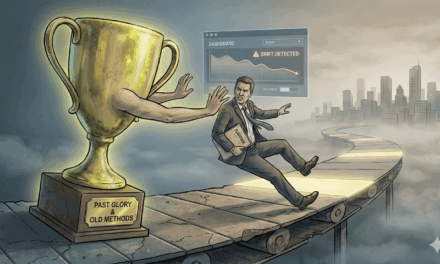
How Sales Managers Should Deal with the “Lone Wolves” on Their Teams

Most sales organizations of a certain size have individual contributors that fall into what is commonly referred to as the “Lone Wolf” archetype: someone that doesn’t like to play by the rules set by leadership yet is nonetheless successful in terms of performance. Think Tom Cruise’s “Maverick” in the “Top Gun” movies. While addressing the lone wolf should not be the top priority in terms of sales coaching and personnel management, doing nothing at all is generally not the best approach either. Like many management issues, it’s a matter of degree and strategy.
The Fundamental Dilemma
The presence of such people poses a dilemma for sales leaders. Particularly if other members of the team are not meeting their respective sales targets, coming down too hard on a non-conformist could prompt them to increase their level of rebellion, reduce effort, or even quit. At the same time, overlooking bad behavior sets a bad example for the rest of the team and forces the sales leader to appear hypocritical if they are selectively enforcing the rules. Before determining how to address the issue, it’s important to take an objective look at whether or not the policies being violated are good policies to begin with and how serious and detrimental the negative behavior is.
Does the Lone Wolf have a point?
While it’s rarely good to tolerate major policy violations while the policy is still in place, it does make sense for sales leaders to reflect on its sensibility. For example, if your company instituted a new three day per week “in office” policy after previously allowing sales reps to work from home full time and the violator typically comes to the office one or two days a week yet is still consistently achieving their targets, it may make sense to revisit the policy in the context of the whole team. Determine if the performance of other reps improved since the new policy was instituted. If not, perhaps the policy should be adjusted, such as having the whole team come in once per week on the day of a regular team meeting.
If the violation is more operational than personal in nature, it’s still important to reflect upon the degree and consequences of the violation. For example, while it’s important for sales managers to have insights into customer meetings and forecasts, how often are you actually required to conduct a formal update? A classic example of negative “lone wolf” behavior is to either neglect to enter customer meeting notes and update a deal stage or forecast in the company CRM tool. If the sales rep routinely neglects to enter relevant notes at all and their forecast is consistently inaccurate, that can present a real challenge to you as a sales manager that needs an accurate view into the health of your business. If it’s merely a question of promptness, such as the sales rep updating the CRM once per week on Fridays as opposed to in real time, it then comes down to how frequently you truly need (vs. personally desire) the information. If you have to roll up your forecast to senior leadership on Monday mornings, a Friday update from the rep may be sufficient, if not ideal.
How severe are the consequences to the overall team?
While the lone wolf may be a thorn in your side, it’s important to assess the level of collateral damage their behavior causes. If they publicly and inappropriately challenge your authority, a ripple effect can occur if it’s not properly confronted. If they act inappropriately towards their fellow sales reps, such as flaunting territory rules or deploying questionable sales tactics that are visible to the team, it can send a signal that such behavior is tolerated so long as the end result of achieving quota is achieved. If it’s merely a question of the lone wolf “having their own style”, such as not following a standard sales playbook, the negative impact of the behavior on the team is likely less severe.
To change behavior, connect on an emotional level and help them understand the payoff for them
When it comes to distributing finite sales coaching resources, while lone wolves should not be prioritized over those with inconsistent performance with a strong desire to improve or high performers who do follow the rules, that does not mean that sales leaders should completely disregard the behavior of lone wolves or neglect to try to change them. As lone wolves are inherently independent, the key to driving change is to help them envision the personal benefits of behavioral change. To do so, the sales leader must understand what ASLAN Sales Training calls the Cornerstone (Receptivity) Principle, which states that if one is emotionally closed, they cannot be persuaded with logical arguments, and in fact may become even more closed off when presented with them. Therefore, instead of simply criticizing the lone wolf, make it clear that you respect and want to understand their point of view before offering yours and asking them to change.
If adhering to a standard sales process will help the rep identify “red flags” in an account, help them understand how doing so can help them improve their retention rate and earn more money as opposed to simply stating “You need to update your deals in CRM every day or else!”. Letting a lone wolf know that you appreciate their contributions to the team’s success and that your role involves helping them be even more successful can go a long way towards molding them into the best version of themselves. Additionally, making it clear that you value their perspective can help you determine which policies are worth enforcing and which may need to be adjusted.



































